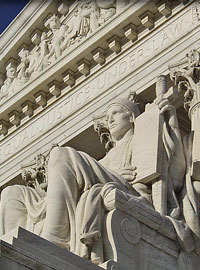| Will ObamaCare Die by Self-Implosion or Court Decision? The Race is On |
 |
|
By Timothy H. Lee
Thursday, March 27 2014 |
Pop quiz: The paramount principle that drew America’s first permanent settlers across the Atlantic, and upon which our nation was founded, was: (a) The freedom to practice one’s religion beyond government interference; or Although posited in jest, that question actually serves to properly frame the issue currently before the United States Supreme Court in Sebelius v. Hobby Lobby Stores, Inc. This nation was established primarily upon the concept of “live and let live.” Our founding documents, including the Declaration of Independence, the Constitution and the Bill of Rights, reflect a moral vision of limited government and protection of individual freedom against government compulsion. Since that time, our national experience has been an ongoing struggle to preserve that vision, and today that struggle is perhaps best illustrated by the legal and political fray surrounding ObamaCare. The fact that legions of left-wing extremists and their media enablers frame the issue as one involving a “war on women” or the imposition of religious views on helpless employees shows how susceptible we are as a culture to distortion of our founding vision. Fortunately, it has become increasingly clear that the law’s demise is merely a matter of “when,” not “if.” Whether that fate arrives due to judicial decree, or rather collapse under its own unsustainable economic and technological contradictions appears to be the emerging question. Under the Religious Freedom Restoration Act of 1993, passed by a nearly unanimous Democratic Congress and signed by President Clinton, even a facially neutral federal law cannot burden the free exercise of religion unless two conditions of “strict scrutiny” are met: (1) The burden is absolutely necessary to achieve a “compelling” government interest, and (2) the law employs the least-restrictive means of achieving that compelling interest. During oral argument this week in the Hobby Lobby case, Chief Justice John Roberts expressed skepticism, asking the Obama Administration’s counsel how ObamaCare’s requirements could be considered “compelling” according to that law when so many exemptions have already been haphazardly granted to labor unions, religious institutions, existing insurance policies, favored companies and others. Similarly, Justice Anthony Kennedy forced the government’s attorney to concede that, “Under your view, a for-profit corporation could be forced in principle to pay for abortions.” Even if ObamaCare’s aims could be defined as “compelling,” moreover, any number of less-restrictive means by which the federal government could achieve those ends exist. For example, it could simply provide subsidies to women seeking birth control or abortive drugs, it could set up government exchanges to provide such drugs or it could establish agreements with manufacturers to provide those drugs to willing consumers. Compelling conscientious objectors to provide them is simply not necessary to satisfy ObamaCare’s scheme. Meanwhile, ObamaCare encountered another daunting legal challenge this week in the D.C. Circuit Court of Appeals, the nation’s second-highest court. Under the letter of the ObamaCare statute, federal subsidies would be available only to citizens who enrolled “through an Exchange established by the State.” That was no accident – Democrats sought to coax states into establishing their own exchanges in order to reduce cost and inconvenience to the federal government. But then a funny thing happened – some 34 states declined to participate in ObamaCare. So the Obama Administration simply ignored the plain letter of the law, and attempted to provide subsidies for people enrolling in the federal program. During oral argument on Tuesday of this week, one judge observed, “If the law is just stupid, I don’t think it’s up to the court to save it.” Another noted, “You kill this, you kill the individual mandate, and you gut the statute,” while the third on the three-judge panel asked why a court should be called to ignore the plain meaning of a law. Many of us predicted ObamaCare’s collapse, as it was defective in concept, creation and execution alike. Even Obama himself has conceded, “Obviously, we didn’t do a good enough job in terms of how we crafted the law.” But that doesn’t allow the Obama Administration to simply rewrite the law, or ignore its clear requirements. Those continuing legal challenges, however, may not even be the foremost of ObamaCare’s concerns. Because enrollment in ObamaCare has fallen well short of the Administration’s forecast of 7 million by March 31, it extended the registration deadline into April. Keep in mind that just two weeks ago, Kathleen Sebelius categorically stated that, “There is no delay beyond March 31,” and White House spokesman Jay Carney flatly denied that any enrollment extension would be allowed. But with time running out, ObamaCare hasn’t attracted enough enrollees, the enrollees it has attracted tend to be those who previously had insurance – contravening the law’s stated rationale of insuring the uninsured – and they skew older and less healthy than projected. Accordingly, the question now is whether the law will first collapse under its own weight, court rulings render it unworkable or a new Congress and administration spare the nation from further damage by repealing and replacing it. |
Related Articles : |
























